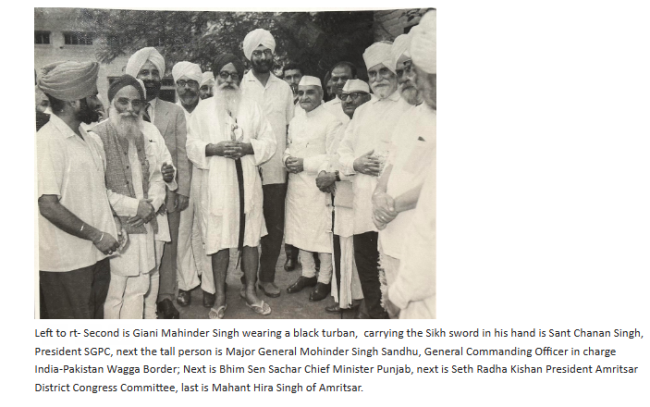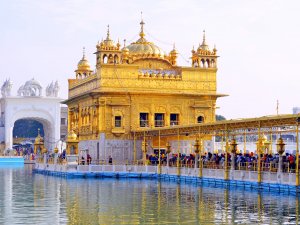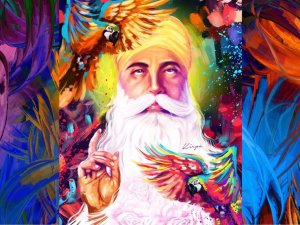I remember Giani Mahinder Singh, the longest-living Sikh religious cum political leader. He concluded his earthly journey of 104 years and left for his timeless voyage on January 3, 2013. I remember many Sikh leaders and admirers attending Giani Ji’s funeral and cremation. His three sons, five daughters, daughters-in-law, sons-in-law, and many grandchildren and great-grandchildren survived him.
Giani Mahinder Singh was born on September 1, 1908, in the town of Tarn Taran in Giani Mangal Singh’s family. Giani Mangal Singh was a renowned Sikh scholar and exegetist.
I remember Giani Ji serving as an official in the secretariat of the Sikhs’ mini parliament, the Shiromani Gurdwara Prabandhak Committee (SGPC). My close contact with him was when I was a student, first at the Gandhi Memorial National College Ambala Cantt and later at Khalsa College-Medical College at Amritsar.
I was fortunate to be introduced to him early in my life.
Giani Mahinder Singh lived to serve the nation for so long because of an unbelievable coincidence that he often used to retell us.
Recalling the tragic times of the Partition of Punjab and India, Giani Mahinder Singh used to tell us and others how he survived the atrocities of the partition.
Only a week before Pakistan’s independence (August 13, 1947), Giani Ji, along with many more Sikhs and Hindus, was abducted by the Baloch Army, who took them to the Police Station in Mujang, Lahore. They were readied to be shot dead when a senior Muslim Army officer spotted Giani Ji and interceded, thus sparing his life and life of many others.
During that period, Giani ji served at Gurdwara Dehra Sahib, Lahore, as a Secretary from 1933 to 1947.
I had the privilege to visit Giani Ji often until I left Punjab for Bombay regularly, then to Delhi, and eventually to the USA.
When in Amritsar, whenever I had a free evening, I always longed to bicycle to his home near Harmandar Sahib. If it was time for Rehras Sahib, I joined him for the recitation before we had an evening meal together at his home. Sometimes we went out for a walk while reciting the prayer.
His narratives about his involvement in Sikh affairs and services, his counseling to national Sikh leaders, and his insight into the Guru’s teachings were very engaging and inspiring.
Let me recount a few of his numerous contributions that I recall and thus celebrate his life.
Giani Mahinder Singh worked with the legendary Shiromani Akali Dal and SGPC Presidents like Jathedar Chanan Singh, Master Tara Singh, Jathedar Udham Singh Nagoke, Jathedar Mohan Singh Nagoke, Sardar Ishar Singh Majhail, Sant Fateh Singh, Sant Chanan Singh, Jathedar Gurcharan Singh Tohra, Jathedar Darshan Singh Pheruman and many more. Thus, he was uniquely knowledgeable about the day-to-day workings of Sikh politics; Sikh leaders often depended on him for his insight on various issues. It was a privilege to listen to his memories of the intrigues behind the scenes in Sikh politics.
Soon after the Sikh holocaust of 1984, I visited Punjab when it was still bleeding. It was the time when the Indian Government machinery in New Delhi was beginning to abolish the SGPC. It proposed to replace SGPC with an appointed Managing Board.
Some of you may not know that knowing his resourcefulness and intimate experience working with Sikh leaders and Sikh institutions, the Punjab Government marked Giani Mahinder Singh to head the new Board and lead the change. The Punjab Governor and the Deputy Commissioner came to Amritsar to personally offer the position of the Chairman of the Board to Giani Ji and seek his help to appoint its other members.
Upon hearing the Government’s plans, Giani Ji became visibly disturbed and instantly turned them down. He harshly warned the officials against it. He told them that the SGPC was created due to unprecedented Sikh sacrifices. None other than Sikh Panth itself could decide if it needed to be replaced, and the Act under which it was formed must not be repealed under the wishes of India’s rulers.
The Government was shocked by this frank dose of opinion against their plan. The plan was disbanded even though some Sikh officials in high government ranks were supportive of the project. Today, we still have SGPC because of Giani Ji’s wisdom and courage.
Giani Mahinder Singh was an eyewitness to many critical events in Sikh history. They included the Akali struggle for the independence of Sikhs and that of India; Sikh morchas to liberate Gurdwara Nanakana Sahib, Gurdwara Punja Sahib; the Guru-ka-Bagh and Jaito morchas (struggles); the Gurdwara Reform Movement in total; the Jallianwala Bagh massacre; and many other going on in the Indian subcontinent during World War II.
Giani Ji’s experience with the Gurdwara Management figures was unparalleled. He was not relieved of his duties as Secretary, as was usual when the SGPC leadership changed, because of his experience and exceptional commitment to serving the Panth. Even after reaching retirement age, he was given extensions for the next eleven years, year after year.
He was also Secretary of the PEPSU (Patiala and East Punjab States Union) Gurdwara Board.
Other organizations that he was actively associated with included the Nankana Sahib Education Trust, the Khalsa College Governing Council, the Singh Sabha, and Chief Khalsa Diwan. He supported the All-India Sikh Students’ Federation and the Sarab Hind Sehajdhari Sikh Organization. I remember long conversations with him about the scope and activities of these organizations.
According to Tribune reports, Giani Mahinder Singh held his fort when the frenzied Muslim populace attacked the gurdwaras in and around Lahore during the Partition mayhem.
“Vallabhbhai Patel often suggested retaliating in a big way, but I refused to accept his suggestion since the situation was virtually out of control in Lahore at that time,” he once recounted to me. He told many stories of his saving Muslim families in Amritsar. They were being targeted for revenge for the indiscriminate murders of Sikh populations in West Punjab.
He still remembered the “black day,” as he called it, when the historical Gurdwara Mujang - Bibi Kaulan Gurdwara Chevin patshahi Lahore in memory of Guru Hargobind, was set ablaze by a frenzied mob. Being Secretary of the Lahore Gurdwara Committee, he pressed the then Army’s Major-Gen Rahis to deploy his forces to protect the Sikh shrines.
Giani Mahinder Singh is said to be responsible for saving priceless murals during the plans to demolish them to rebuild the Akal Takht in 1984. Sikhs were not accepting of the rushed Indian government-sponsored reconstruction of the Takht. It was designed to hide Takhat’s destruction by government troops in June 1984. It was Giani Ji’s intervention that the original podium of Guru Hargobind was saved from destruction. The Guru used to be seated on it to address the congregations.
There was no one else around to be familiar with the importance of the critical features of the Takht. On Giani Ji’s recommendation, the SGPC then took charge of preserving these historical possessions.
Giani Mahinder Singh was also a revered religious leader. His residence was frequently visited by top granthis, Akali stalwarts like the SGPC President Jathedar Gurcharan Singh Tohra, and famous raagis who visited Amritsar. It was at his residence that I met many Sikh dignitaries.
Giani Ji was still active and full of dynamism even in the final days of his life. He did his daily prayers, listened to the live Gurbani kirtan from Darbar Sahib, read newspapers, and stretched to keep his body healthy.
Asked about the secret of his longevity, he always said, “Honesty and simplicity.”
A vegetarian, he credited his long and healthy life to clean living, good genes, and regular Amrit-vela cold showers.
Giani Mahinder Singh and his wisdom for the betterment of the Panth will be missed by all of us and the Sikh leadership. His youngest daughter-in-law Jaswinder Kaur told me he used to recite the nitnem daily. His final prayer to Waheguru before taking his last breakfast was that all the Panthic bodies might be united and be guided to work together. She stressed that he named every major Sikh organization in his last prayer.
We can pay tribute to this great soul by working towards the unity of the Sikh nation.
----------------------------------------------------------------------------------------------------------------
Note: An earlier version was published on January 5, 2012, as:







